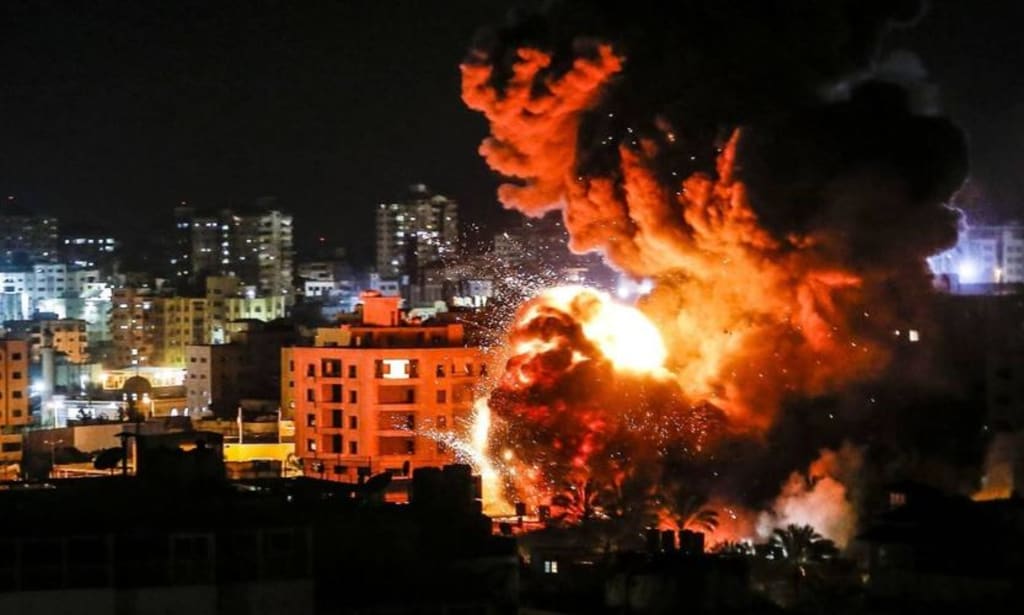Commencement of Hostilities! A hundred rockets rain down, setting Israel ablaze with fire and light.
ahong

The Unfolding Drama in the Middle East: Israel's Strategic Moves
It seems like Israel isn't playing around this time! Its recent military activities are not just creating ripples in the Gaza Strip but also targeting Lebanon and Syria. The drama behind these actions is more intense than "Game of Thrones." On the surface, Israel claims to be weakening Hamas, but its real target appears to be Hezbollah, supported by Iran. This is not just a local conflict but a full-scale geopolitical contest. This article will delve into the underlying intentions of Israel's actions, explore their relationship with regional stability, and analyze the international community's response. Grab your seat and watch how this war drama unfolds.
1. Israel's New Adversary: Hezbollah
Do you think Israel is merely teaching Hamas a lesson this time? You're too naive if you believe that. Recent Israeli military actions clearly indicate that their focus has shifted to Hezbollah. Let's review, on June 5th, Middle Eastern media reported that Israel was actively preparing a significant move against Hezbollah in Lebanon. It's not a minor skirmish; it looks like a comprehensive solution is on the cards. Yes, you heard it right, Hezbollah, the organization armed to the teeth and backed by Iran.
Why the sudden shift in targets? Simply put, Hezbollah is not just a problem for Lebanon but also a crucial trump card for Iran in the Middle East. If Israel can make a breakthrough on this issue, it would undoubtedly be a significant blow to Iran's influence. The rules of this game are clear – whoever controls the proxies gains the upper hand in this ruthless geopolitical contest. Israel clearly does not want to leave such a significant threat on its doorstep. Thus, they seem to have decided it's time to get serious.
2. Full Force: Israel's Tactical Adjustments
Don't think that Israel's military actions this time are as simple as firing rockets or dropping bombs. They are really investing heavily. What we see is a series of precise airstrikes targeting Hezbollah's strongholds and those high-ranking military commanders that sound terrifying. Hezbollah must be feeling the immense pressure, as if sitting on a barrel of gunpowder. But Israel has its reasons for doing this. They don't just want to destroy a few military bases; more importantly, they want to weaken Hezbollah – and even Iran's influence in the region.
Recall that Hezbollah is not to be taken lightly; their counterattacks against Israel are also ruthless. Rockets, drone attacks, even incendiary bombs, they have used all sorts of means. This is undoubtedly a huge challenge for Israel. But Israel's military strategy seems to be prepared for all possibilities. Their goals are clear, and their actions are swift; this determination and execution are not to be underestimated.
3. International Chessboard: The Position and Influence of the United States
In the background of this regional conflict, you must not overlook the role of the United States. The U.S. has always been a staunch supporter of Israel, but in recent developments, America's stance appears to be somewhat complex. The Biden administration has expressed dissatisfaction with some of Netanyahu's actions, believing these military adventures might be excessive actions taken for political survival. This accusation not only puts pressure on Israel but also leads to more questioning of Israel's actions by the international community.
But let's think about what the U.S. truly intends here. Is it to stabilize the Middle East or just to protect its allies? Or, on a deeper level, is it also about controlling Israel's behavior to balance the power in the Middle East? Regardless, every statement from the U.S. could change the rules of the game and affect the political landscape of the entire Middle East and even the world. This is not just a regional conflict; it's part of the international drama.
Conclusion: Possibilities and Challenges for Peace
Reading this, you might ask: Where is the possibility of peace? Frankly, the current situation is complex and changeable. Every military action could trigger new conflicts, and every diplomatic effort could bring about a turning point. But one thing is certain: only when all parties involved – not just Israel and Hezbollah, but also Iran, the United States, and the broader international community – sit down and solve problems peacefully, can these series of conflicts truly end.
Peace in the Middle East will not come easily, but through international cooperation and sincere dialogue, there is always a glimmer of hope. Now, we can only keep a close eye on this region to see how this strategic game of multi-party contention will evolve in the end. It is hoped that all parties will wisely choose the path of peace and development, bringing long-lost tranquility to this troubled region.
About the Creator
ahong
I'm Ahong, a writer painting China's stories for the world. Dive into tales that blend tradition with the contemporary, right from the heart of China.
Enjoyed the story? Support the Creator.
Subscribe for free to receive all their stories in your feed. You could also pledge your support or give them a one-off tip, letting them know you appreciate their work.






Comments
There are no comments for this story
Be the first to respond and start the conversation.